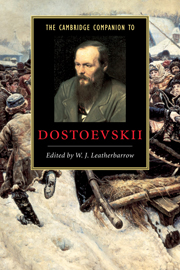Book contents
- Frontmatter
- 1 Introduction
- 2 Dostoevskii and the Russian folk heritage
- 3 Dostoevskii and literature
- 4 Dostoevskii as a professional writer
- 5 Dostoevskii and money
- 6 Dostoevskii and the intelligentsia
- 7 Dostoevskii and psychology
- 8 Dostoevskii and religion
- 9 Dostoevskii and the family
- 10 Dostoevskii and science
- 11 Conclusion
- Further reading
- Index
2 - Dostoevskii and the Russian folk heritage
Published online by Cambridge University Press: 28 May 2006
- Frontmatter
- 1 Introduction
- 2 Dostoevskii and the Russian folk heritage
- 3 Dostoevskii and literature
- 4 Dostoevskii as a professional writer
- 5 Dostoevskii and money
- 6 Dostoevskii and the intelligentsia
- 7 Dostoevskii and psychology
- 8 Dostoevskii and religion
- 9 Dostoevskii and the family
- 10 Dostoevskii and science
- 11 Conclusion
- Further reading
- Index
Summary
Outside Russia it is the philosophical, moral, psychological and political problems in Dostoevskii's work that have fascinated readers, not its possible folkloric connections. Even in Russia for several decades the question of the writer's relationship to the folk heritage was barely posed – somewhat surprisingly, since Dostoevskii was writing when the mainly illiterate peasantry, numerically by far the largest social group, depended on an oral culture that shaped and expressed their world-view. Furthermore, the writer himself came to see the religious and moral ideals of ordinary Russians, which were embodied in their oral culture, as the key to Russia's salvation. That oral culture was also appearing in print in great quantities in the 1860s and 1870s when the major novels were being written: not only the standard collection of folktales (1855-63) and proverbs (1862), but also Christian legends (1859) and all kinds of sung poetry, especially the epic (bylina) and songs about Russian history (1861-7 and 1873), as well as folk-poetic laments (1872), and spiritual songs (dukhovnye stikhi) (1860 and 1861-4). These were accompanied by the continuing publication of accounts of peasant rituals, beliefs and superstitions. The reason for this lack of interest is not so much the undeniable importance of the larger philosophical issues in the novels as Dostoevskii's creative method. Whereas most Russian writers who draw on folklore make their source clear, whether through quotation, imitation or parallels, Dostoevskii tended to rework folkloric material, to integrate it into an image, a character, an incident or even his method of narration along with material from other sources, all subjected to his controlling vision. In particular, he was fond of interweaving motifs drawn from the Bible or official Orthodoxy with those from folk Christianity, though other combinations with philosophical concepts, literature, discussion of contemporary social and political issues and so on are common.
- Type
- Chapter
- Information
- The Cambridge Companion to Dostoevskii , pp. 21 - 46Publisher: Cambridge University PressPrint publication year: 2002



